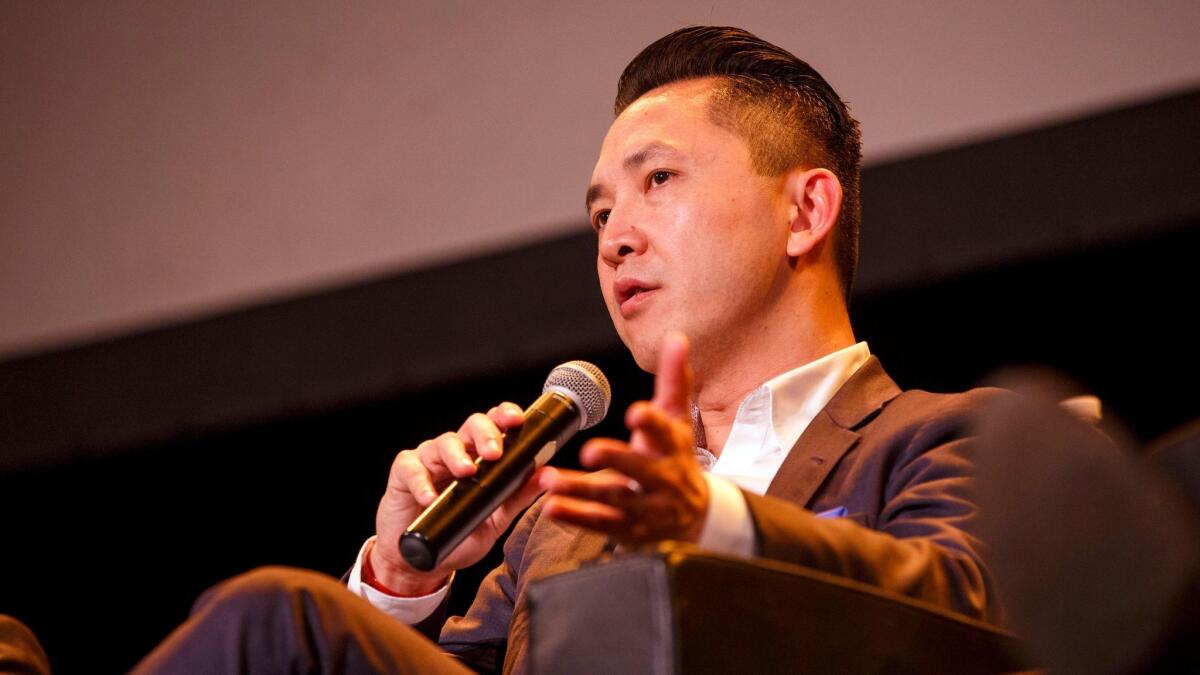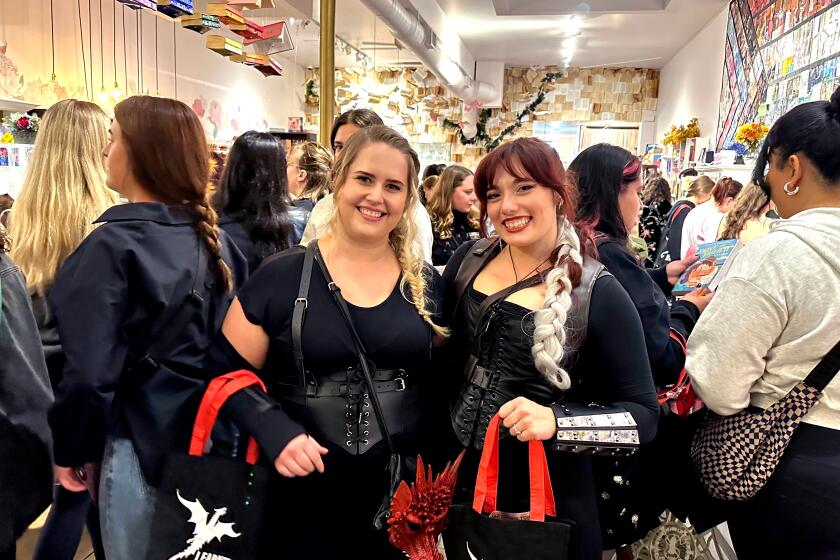Review: In Viet Thanh Nguyen’s ‘The Refugees,’ wistfulness is an anthem of displacement

- Share via
In a short time, Viet Thanh Nguyen has encircled the American literary consciousness: first with his mind-bending 2015 novel “The Sympathizer,” then last year’s cultural history “Nothing Ever Dies” and now with eight short stories entitled “The Refugees.”
Nguyen, the Aerol Arnold Chair of English and professor of English and American studies and ethnicity at USC, has called refugees “the zombies of the world” because they are haunted, unwanted at home and abroad.
In “Black-Eyed Women,” the first tale in his new collection, his characters do share such qualities with the undead. The narrator is a 38-year-old Vietnamese refugee, working as a ghostwriter and living in near silence with her mother. She leads a denatured American life — her gender unclear until the ninth page. Then her brother, who died 25 years earlier aboard their boat as they were fleeing Vietnam, begins visiting both women as a ghost. He appears to still be 15, still wet from swimming the Pacific.
“Black-Eyed Women” is imbued with much more melancholy than horror, such woe being “proof,” the narrator says “that we did not belong here. In a country where possessions counted for everything, we had no belongings except our stories.”
The telling doesn’t come easily. Nguyen has said “Black-Eyed Women” went through at least 50 drafts over perhaps 14 years. Such intense labor contrasts with “The Sympathizer,” a more experimental novel that the writer said flowed from its now-celebrated first sentence: “I am a spy, a sleeper, a spook, a man of two faces.”
Nguyen, himself a refugee, is drawn to dualities, as he writes in the prologue to “Nothing Ever Dies”: “I was born in Vietnam but made in America. I count myself among those Vietnamese dismayed by America’s deeds but tempted to believe its words.”
The narrator’s mother in “Black-Eyed Women” comforts herself by watching Korean soap operas, which “she rented by the armfuls.” She tells her daughter, “If we hadn’t had a war . . . we’d be like the Koreans now. Saigon would be Seoul, your father alive, you married with children, me a retired housewife, not a manicurist.”
Wistfulness threads through “The Refugees” like an anthem of displacement. The text is barbed with subtle humor that is wry and painful. The resulting stories are beautiful in their astringency and shifting points of view, but no reader will set them down feeling jolly. Nguyen’s writing travels along a spine of moral reckoning.
“Someone Else Besides You” is a father-son story that excavates basic questions of masculinity, told by the son, who “was thirty-three, but my father didn’t think anyone was a man until he fathered children.” The patriarch, a former Vietnamese paratrooper, is still fit enough to parade in his camouflage uniform through Little Saigon; he accuses his divorced son of running to fat. The pair make an unannounced and disastrous visit to the son’s ex-wife, which precipitates some vandalism and, perhaps, a glimmer of resolution for the younger man.
Throughout “The Refugees,” characters live in fractured families and wrecked partnerships; they come up against — and practice — subterfuge and duplicity. In “The Transplant,” a California gambler is conned by both his loneliness and a new Vietnamese acquaintance to stash counterfeit goods in his Orange County garage. The mark mistakenly believes the trafficker’s father saved his life with a donated liver. As with all of Nguyen’s stories, the title “The Transplant” has multiple meanings.
One of the best entries is “The War Years,” narrated by an adult remembering when his parents ran a Vietnamese grocery in San Jose’s Little Saigon. In 1983, he witnesses his parents being shaken down by two forces: a stranger with a revolver and a fellow refugee, Mrs. Hoa, who aggressively collected money to fund a quixotic insurrection against Vietnam’s Communist regime. The narrator’s mother casts herself as the family savior:
“ ‘Five cents is my profit on a can of soup.’ As my mother drove, she kept her foot on the brake, not the accelerator. My head bounced back and forth on the headrest like a ball tethered to a paddle. ‘Ten cents for a pound of pork, twenty-five cents for ten pounds of rice. That woman wants five hundred dollars from me, but you see how we fight for each penny?’ ”
Nguyen, whose parents ran a little grocery, uses “The War Years” to meditate on honor, debt, memory and the gritty currency of survival. A few stories — such as “The Americans” and “I’d Love You to Want Me” — seem at a loss for an ending, but overall, the collection casts a formidable spell, especially at this political moment when refugees are both a lightning rod and an abstraction.
The aching final story, “Fatherland,” centers on a feckless playboy in Vietnam who survived brutal years in a Communist labor camp. He has had two sets of children — one who fled with their mother to the United States, and a replacement set, with the same names. Now he gives tours to Americans visiting the infamous tunnels dug during the war years. His in-country daughter Phuong watches:
“In a few days, or a week, or two weeks, [the tourists] would leave, their most vivid memory about this day being the funny experience of crawling on their knees through a tunnel, with a vague memory of the passionate little tour guide and his somewhat quirky English. We’re all the same to them, Phuong understood with a mix of anger and shame — small, charming, and forgettable.”
Very little is forgettable in these lapidary stories. Particularly the collection’s dedication: “For all refugees, everywhere.”
Long manages the Anisfield-Wolf Book Awards for the Cleveland Foundation.
Viet Thanh Nguyen
Grove: 224 pp., $25
More to Read
Sign up for our Book Club newsletter
Get the latest news, events and more from the Los Angeles Times Book Club, and help us get L.A. reading and talking.
You may occasionally receive promotional content from the Los Angeles Times.










